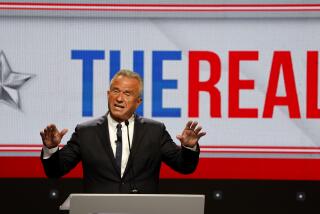Bush ‘Out of Ideas,’ Kennedy Says in Sharp Attack
- Share via
WASHINGTON — President Bush has “run out of ideas” and has no foreign or domestic policy agenda for governing the nation, which will result in either “a period of half measures or at worst a time of deadlock and indecision,” Sen. Edward M. Kennedy (D-Mass.) charged Monday.
But, in making one of the sharpest attacks yet on the 6-week-old Bush Administration by a leading Democrat, Kennedy also criticized Massachusetts Gov. Michael S. Dukakis, his party’s 1988 presidential nominee.
Cites Dukakis Failures
Dukakis lost to Bush primarily because he failed to deliver a “compelling Democratic message” and allowed Republicans’ negative attacks to fill the campaign vacuum, he said.
Kennedy, who is often called one of the Senate’s most liberal members, said that former President Ronald Reagan was a more effective chief executive than Bush.
Kennedy avoided Democratic leaders’ recent professions of bipartisanship and cooperation with the White House in criticizing Bush, saying: “The President’s poll ratings are still high, but, underneath, the erosion is already setting in.”
In referring to Bush’s troubled nomination of John Tower as defense secretary, he said: “The problem is not just the Tower disaster or the Administration’s unprecedented failure to fill most of the top posts in government. That failure only reflects a deeper weakness.”
He asserted that the President and the GOP “have run out of ideas” and argued that the Administration “has no agenda, other than coping, no real budget, no major initiatives and very little to say about what George Bush calls ‘the vision thing.’ ” That situation, Kennedy predicted, will produce a “time of deadlock and indecision.”
Sees Danger for Party
But, he added, “for Democrats, it represents both a danger and an opportunity--a danger, because with it comes the temptation to do nothing except criticize, while waiting for the Bush presidency to falter. In my view, that is both wrong in principle and bad politics. We dare not forget the lesson of last year: George Bush was supposed to be easy to beat. . . . I hope Democrats never again fall into that trap.”
The Democrats do, however, have an opportunity now to outline a new path for the 1990s and beyond to accommodate changing realities and enduring ideals, he said.
“Across a range of concerns where the Administration seems frozen in the ice of its own intellectual emptiness, the creative initiative will pass over to the Democratic Party if we choose to take it,” he said. “As Democrats, we have to transcend the narrow choice between bigger deficits and lesser programs, between throwing money at problems and throwing up our hands in helpless indifference, between standing still and raising taxes.”
In contrast to Bush, Reagan was an effective President because he stood for a set of ideas, which he stated in 1980, then “wrote most of them not only into public law but into the national consciousness,” Kennedy said.
Speaks at Yale
But the GOP cannot live off Reagan’s legacy any more than Democrats can succeed by simply repeating Franklin D. Roosevelt or John F. Kennedy, he told students at Yale University, Bush’s alma mater, where Kennedy, a Harvard alumnus, spoke as part of the annual Chubb Fellowship program.
“We have the ideas--now we have to muster the will to stand for them and run on them,” he said. “If we do that--then, in 1992, we can succeed in removing a Yale President from the White House--even if we don’t succeed in replacing him with someone from Harvard.”
More to Read
Get the L.A. Times Politics newsletter
Deeply reported insights into legislation, politics and policy from Sacramento, Washington and beyond. In your inbox twice per week.
You may occasionally receive promotional content from the Los Angeles Times.










